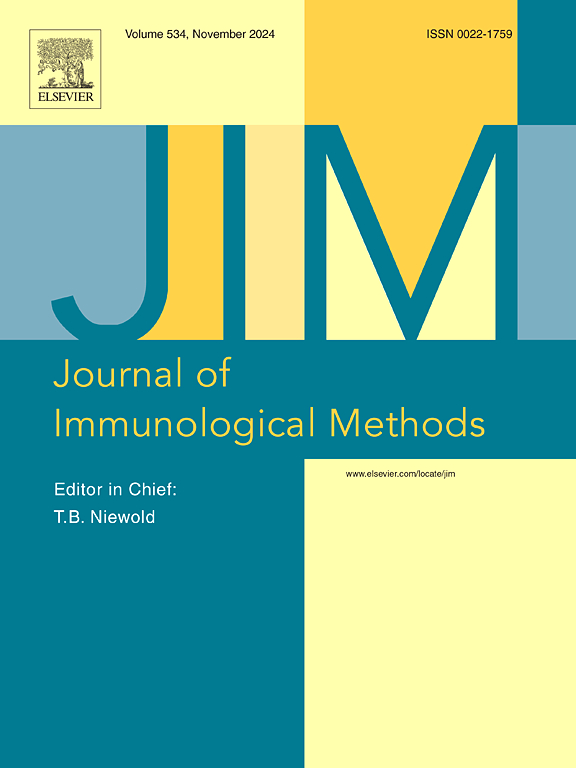Generation and characterization of a monoclonal antibody Fab fragment targeting PBP2a in methicillin-resistant Staphylococcus aureus
IF 1.6
4区 医学
Q4 BIOCHEMICAL RESEARCH METHODS
引用次数: 0
Abstract
Methicillin-resistant Staphylococcus aureus (MRSA) is one of the main pathogens associated with nosocomial and community infections that are difficult to treat owing to its resistance to all β-lactams and other classes of antibiotics. Reports of MRSA demonstrate the pathogen relevance and urgency for developing innovative diagnostic and treatment strategies against this microorganism. In this context, monoclonal antibodies (mAbs) represent a powerful tool for such purposes. Beta-lactam resistance in MRSA is caused by penicillin-binding protein 2a (PBP2a). The characteristics of PBP2a make this protein a potential target for immunobiologicals to combat this pathogen. This study describes the development of a recombinant Fab fragment from a mAb directed against the PBP2a protein, designed to identify and treat MRSA infections. The Fd and light chain coding sequences for Fab expression were amplified and ligated into the mammalian cell expression vector. Recombinant DNA constructs were used to transfect Expi293F cells expressing anti-PBP2a Fab. A purification based on ion-exchange chromatography was used for Fab separation, followed by analysis of antigen target recognition and interaction, either with the isolated antigen or with the antigen on the MRSA cell surface. The experimental approach allowed us to obtain significant Fab expression levels in the Expi293F system when transfecting the cells with the genetic constructs developed in pCDNA3.4 vector. Antigen target interaction assays revealed the capacity of Fab to recognize and interact with the PBP2a protein. Biodistribution analysis indicated serum Fab presence, in the serum, kidneys, lungs, and spleen, and a plasma half-life averaging 6–8 h.
针对耐甲氧西林金黄色葡萄球菌中 PBP2a 的单克隆抗体 Fab 片段的生成和特性分析。
耐甲氧西林金黄色葡萄球菌(MRSA)是与医院内和社区感染有关的主要病原体之一,由于其对β-内酰胺类和其他类抗生素具有耐药性,因此难以治疗。有关 MRSA 的报道表明,开发针对这种微生物的创新诊断和治疗策略具有病原体相关性和紧迫性。在这种情况下,单克隆抗体(mAbs)是一种强有力的工具。MRSA 的β-内酰胺耐药性是由青霉素结合蛋白 2a(PBP2a)引起的。PBP2a 的特性使其成为免疫生物制剂对付这种病原体的潜在靶标。本研究描述了一种针对 PBP2a 蛋白的 mAb 重组 Fab 片段的开发过程,旨在识别和治疗 MRSA 感染。用于表达 Fab 的 Fd 和轻链编码序列被扩增并连接到哺乳动物细胞表达载体中。重组 DNA 构建用于转染表达抗 PBP2a Fab 的 Expi293F 细胞。利用离子交换色谱纯化法分离 Fab,然后分析抗原靶标识别和与分离抗原或 MRSA 细胞表面抗原的相互作用。用 pCDNA3.4 载体开发的基因构建体转染 Expi293F 系统时,这种实验方法使我们能够在 Expi293F 系统中获得显著的 Fab 表达水平。抗原靶向相互作用测定显示,Fab 有能力识别 PBP2a 蛋白并与之相互作用。生物分布分析表明,血清、肾脏、肺部和脾脏中都存在 Fab,血浆半衰期平均为 6-8 小时。
本文章由计算机程序翻译,如有差异,请以英文原文为准。
求助全文
约1分钟内获得全文
求助全文
来源期刊
CiteScore
4.10
自引率
0.00%
发文量
120
审稿时长
3 months
期刊介绍:
The Journal of Immunological Methods is devoted to covering techniques for: (1) Quantitating and detecting antibodies and/or antigens. (2) Purifying immunoglobulins, lymphokines and other molecules of the immune system. (3) Isolating antigens and other substances important in immunological processes. (4) Labelling antigens and antibodies. (5) Localizing antigens and/or antibodies in tissues and cells. (6) Detecting, and fractionating immunocompetent cells. (7) Assaying for cellular immunity. (8) Documenting cell-cell interactions. (9) Initiating immunity and unresponsiveness. (10) Transplanting tissues. (11) Studying items closely related to immunity such as complement, reticuloendothelial system and others. (12) Molecular techniques for studying immune cells and their receptors. (13) Imaging of the immune system. (14) Methods for production or their fragments in eukaryotic and prokaryotic cells.
In addition the journal will publish articles on novel methods for analysing the organization, structure and expression of genes for immunologically important molecules such as immunoglobulins, T cell receptors and accessory molecules involved in antigen recognition, processing and presentation. Submitted full length manuscripts should describe new methods of broad applicability to immunology and not simply the application of an established method to a particular substance - although papers describing such applications may be considered for publication as a short Technical Note. Review articles will also be published by the Journal of Immunological Methods. In general these manuscripts are by solicitation however anyone interested in submitting a review can contact the Reviews Editor and provide an outline of the proposed review.

 求助内容:
求助内容: 应助结果提醒方式:
应助结果提醒方式:


